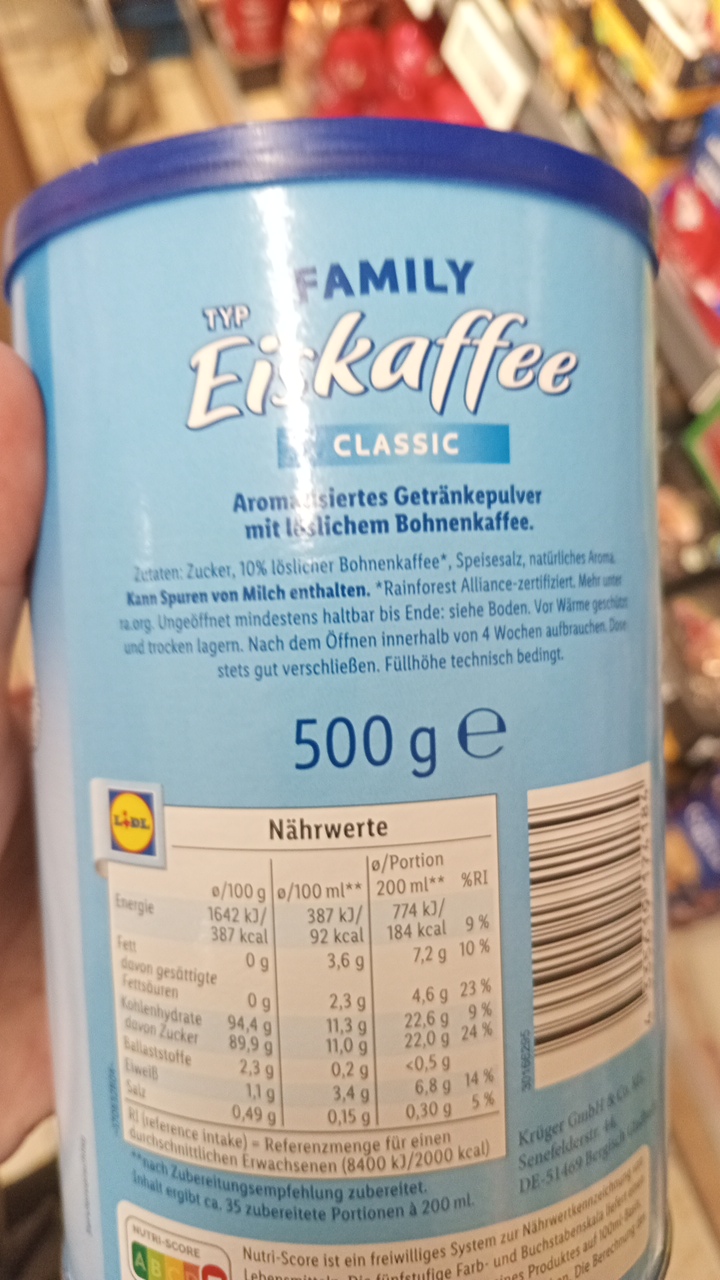
Barcode: 4335619174184
eiskaffee
HALAL
📝 Reason: The ingredients list does not contain any known Haram substances or Haram E-numbers. However, ‘natürliches aroma’ (natural flavor) can be derived from animal sources or may use alcohol as a solvent, so without certification, its status is Doubtful. As per Islamic law (Quran 5:3: forbids Haram foods and ingredients of unknown origin are to be avoided unless their source is clarified), and halal certifiers (like IFANCA), doubtful ingredients render the product status as Doubtful until properly certified.
🏷️ Category: Coffee, Beverage
📄 Certificates: Classic, 500 G, Vegetarisch
Ingredients:
Details
Understanding the Halal Status of eiskaffee
When it comes to beverages like eiskaffee, ensuring Halal compliance is essential for many consumers. Many individuals seek clarity on whether their favorite products align with Islamic dietary laws, and eiskaffee is no exception. In this discussion, we will explore the Halal status of eiskaffee by closely examining its ingredients, specifically focusing on any potential issues regarding Halal compliance.
Ingredients Breakdown
eiskaffee typically contains the following key ingredients:
- Zucker (Sugar)
- Löslicher Bohnenkaffee (Soluble Coffee)
- Speisesalz (Table Salt)
- Natürliches Aroma (Natural Flavor)
Ingredient Analysis
Each of these ingredients has its specific Halal status:
Zucker (Sugar)
Sugar is a widely consumed plant-based ingredient, and there are no animal derivatives involved in its standard production process. According to [Halal Food Certification](https://www.halalfoodcertification.us/faq/sugar-halal-or-haram), sugar is considered Halal. Its role in eiskaffee certainly poses no conflict with Halal laws.
Löslicher Bohnenkaffee (Soluble Coffee)
Soluble coffee, derived from coffee beans, is naturally free from any animal products or alcohol. This ingredient is researched and verified by sources such as [IFANCA](https://www.ifanca.org/resources/faq/) and [Is It Halal](https://www.isitHalal.com/coffee/), both confirming its Halal status.
Speisesalz (Table Salt)
Table salt is a mineral that is inherently Halal. With no animal or forbidden sources involved in its production, it is considered safe for consumers following Halal guidelines. This assertion is supported by [Halal Googling](https://www.halalgoogling.com/halal-or-haram-is-salt-halal/).
Natürliches Aroma (Natural Flavor)
Natural flavors or aromas, while commonly used in many food products, can be a point of concern. These flavors may derive from either plant or animal sources. Since the specific origin of ‘natürliches aroma’ is not disclosed in eiskaffee’s ingredient list, its Halal status remains categorized as Doubtful. According to [IFANCA](https://www.ifanca.org/faq/natural-flavors-halal/) and further information by [Eat Halal](https://www.eat-halal.com/natural-flavour-natural-flavouring), ingredients like this should be approached cautiously, as their Halal compliance can vary widely depending on their source.
Conclusion
To summarize, while the primary ingredients in eiskaffee, including sugar, soluble coffee, and table salt, are all Halal, the status of ‘natürliches aroma’ raises concerns. Without proper certification or information regarding its origin, consumers are advised to treat this ingredient as doubtful. According to Islamic law, products containing ingredients with uncertain origins should be avoided unless they are verified, as per Quran 5:3, which dictates that all Haram foods must be avoided.
In the end, it’s crucial to check for Halal certification labels, which ideally should be present on packaging if available. Because eiskaffee’s Halal status significantly hinges on the natural flavor, certification from recognized bodies like IFANCA can offer the assurance needed for Halal-conscious consumers.
